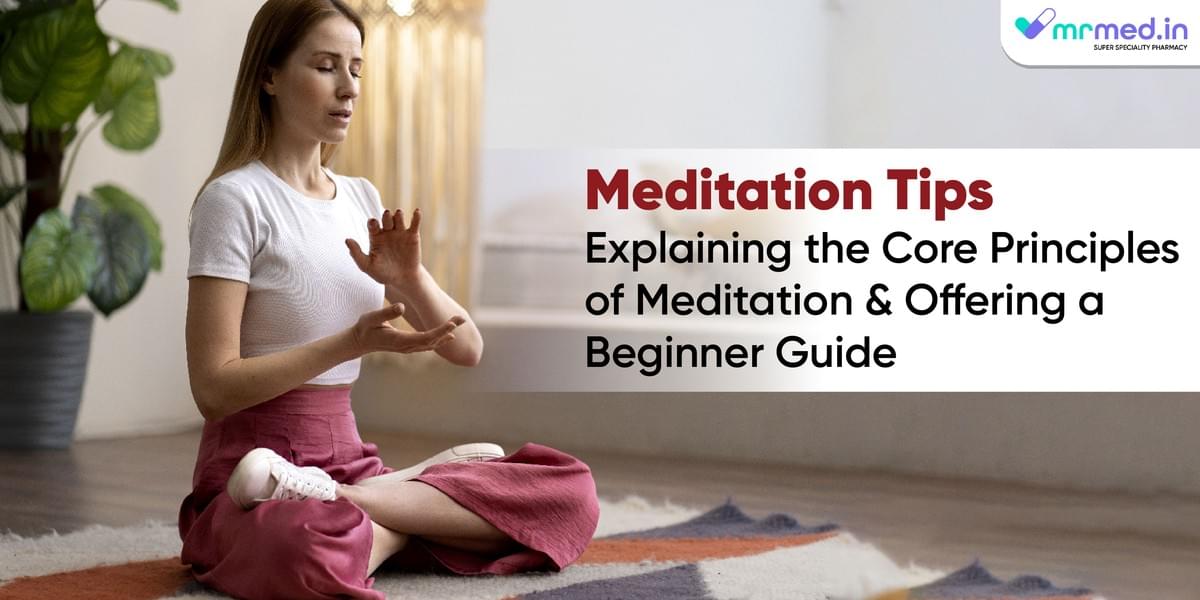Meditation has been practised for thousands of years and is renowned for its profound benefits on mental wellness. It can help reduce stress, enhance concentration, and promote a sense of calm and inner peace. For beginners, understanding the core principles of meditation and how to get started can be the first step toward a healthier mind and body. This blog delves into the fundamentals of meditation and offers a comprehensive guide for those new to the practice.

Meditation is a practice where an individual uses techniques such as mindfulness, focusing the mind on a particular object, thought, or activity to train attention and awareness and achieve a mentally clear and emotionally calm state. The core principles of meditation include:
- Mindfulness: Being present in the moment and fully engaged with whatever you are doing at that moment.
- Focused Attention: Concentrating on a single point of reference, such as the breath, a mantra, or a visual object.
- Relaxation: Allowing the body and mind to relax, releasing tension and stress.
- Non-Judgment: Observing thoughts and sensations without labelling them as good or bad.
What are the benefits of meditation?
The benefits of meditation extend beyond mental wellness to include physical health improvements. Some key benefits include:
- Stress Reduction: Meditation can lower cortisol levels, the hormone associated with stress, helping to reduce overall stress.
- Improved Concentration: Regular practice enhances focus and cognitive function.
- Emotional Well-Being: Meditation promotes a positive outlook on life, increases self-awareness, and reduces symptoms of anxiety and depression.
- Physical Health: Meditation can help lower blood pressure, reduce pain, and improve heart health. It can also reduce hypertension.
What is the first rule in meditation?
Starting a meditation practice can be simple and requires no special equipment. Here is a step-by-step guide for beginners:
- Find a Quiet Space: Choose a quiet and comfortable place where you won’t be disturbed.
- Set a Time: Start with a few minutes each day and gradually increase the duration as you become more comfortable.
- Sit Comfortably: You can sit on a chair, cushion, or the floor. Keep your back straight and your hands resting on your knees or in your lap.
- Focus on Your Breath: Close your eyes and take a few deep breaths. Focus on the sensation of the breath entering and leaving your body.
- Observe Your Thoughts: As you meditate, thoughts will inevitably arise. Acknowledge them without judgment and gently bring your focus back to your breath.
- Use a Mantra: If you find it difficult to focus, you can use a mantra—a word or phrase repeated silently. Common mantras include "Om" or "Peace."
What are the types of meditation?
There are various types of meditation, each with unique techniques and goals. Some popular forms include:
- Mindfulness Meditation: Focuses on being aware of the present moment.
- Transcendental Meditation: Involves silently repeating a mantra to achieve a state of relaxed awareness.
- Loving-Kindness Meditation: Aims to cultivate an attitude of love and kindness toward oneself and others.
- Body Scan Meditation: Involves focusing on different parts of the body and releasing tension.
How to incorporate meditation into daily life?
Integrating meditation into your daily routine can amplify its benefits. Here are some tips to help you incorporate meditation into your life:
- Consistency: Try to meditate at the same time each day to build a habit.
- Create a Routine: Combine meditation with other daily activities, such as before bedtime or after exercise.
- Use Apps or Guided Meditations: There are many apps and online resources that offer guided meditations, making it easier for beginners to start.
Certain health supplements can support mental wellness in addition to meditation. Supplements such as omega-3 fatty acids, magnesium, and adaptogenic herbs can enhance brain function, reduce stress, and improve mood. For instance, Cannabliss Stress Buster OIL is known for its calming effects and can be used to complement meditation practice.
What are common meditation challenges?
Many beginners face challenges when starting a meditation practice. Here are some common issues and how to overcome them:
- Restlessness: It's normal to feel restless or fidgety. Start with shorter sessions and gradually increase the duration.
- Sleepiness: If you feel sleepy while meditating, try practising at a different time of day or in a different position.
- Distraction: It's natural for the mind to wander. Gently bring your focus back to your breath or mantra without frustration.
What is the theory behind meditation?
Numerous studies have demonstrated the positive effects of meditation on the brain and body. Research shows that regular meditation can lead to changes in brain structure, including increased grey matter in areas associated with learning, memory, and emotional regulation. It also reduces activity in the brain's "default mode network," which is linked to mind-wandering and self-referential thoughts.
What are the long-term benefits of meditating?
The long-term benefits of meditation are profound and can lead to lasting improvements in overall well-being. Some of the long-term benefits include:
- Enhanced Self-Awareness: Greater insight into thoughts and behaviours.
- Emotional Stability: Increased ability to manage emotions and stress.
- Better Relationships: Improved empathy and communication skills.
- Greater Resilience: Enhanced ability to cope with life's challenges.
Meditation is a powerful tool for improving mental wellness and overall health. By understanding its core principles and incorporating it into your daily routine, you can experience its numerous benefits. Whether you're looking to reduce hypertension, manage stress, or simply find inner peace, meditation can be an effective and accessible practice.
